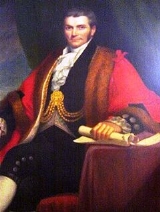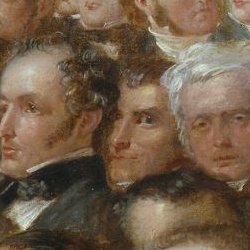
Richard Peek
Encyclopedia
Richard Peek was a tea merchant in London from modest beginnings in Loddiswell
in Devon
. He rose to be one of the Sheriffs of the City of London
. He was a known abolitionist and philanthropist in his home area. Whilst sheriff he sent a missionary into Newgate Prison
.
to go to Plymouth where he worked for a grocer. He reputedly walked to London and remet a Quaker who arranged for his new employment at a tea merchants called Sanderson and Barklay. Peek did so well that not only was he promoted but two of his brothers also travelled up from Devon to join the trade. The three brothers, Richard, William and James Peek eventually set up their own firm in 1823 (after William initially led the way with a family business in 1818).
The business prospered as the East India Company
's monopoly on the importation of tea ended and Peek Bros and Co. set up offices in Liverpool. This firm was still in business in 1958 trading as Peak Bros. and Winch. Peek was elected to be on the Corporation of London
and subsequently one of the Sheriffs of the City of London
in 1832. During his tenure as Sheriff he funded a missionary to visit the prisoners in Newgate Prison
. He was also noted for his hatred of capital punishment and it was said that he would meet the Secretary of State at odd hours in an attempt to intercede on behalf of the condemned. The Secretary of State at the time was Robert Peel
.
Peek had built a home called Hazelwood in his home village and had moved his father into the house. This house was on the same site of a previous building where Richard was born.
The partnership between the Peek brothers in Liverpool was dissolved "by mutual consent" on 30 May 1834 when Richard retired from the business. The remaining business was in Cheapside
in London. He retired from that as well on 21 December 1838.
 Peek was on the organising committee and attended the 1840 World's Anti-slavery convention in London and he was included in the painting which is now in the National Portrait Gallery in London.
Peek was on the organising committee and attended the 1840 World's Anti-slavery convention in London and he was included in the painting which is now in the National Portrait Gallery in London.
The second international Anti-Slavery convention was in 1843 when Peek was a vice-president of the convention with other notables including John Cropper
who had also had a business in Liverpool. Peek took the chair of the convention when Samuel Gurney
had to leave.
Peek was reported as being an instigator of The Patriot magazine which did much for forwarding abolitionism in Britain.
One of his gifts was a chapel at Dodscombe which he funded before his death, but he had supplied weekly free medical attention in his home village as well as funding a news and reading room in 1839.
After he retired back to Loddiswell he became a magistrate known for his philanthropy. He gave land fo a local school in 1841 and later gave land to fund its upkeep The British School was founded in 1853. Early records show that the fees of many early students were met by the school, moreover Richard Peek would open his home once a year to give tea to the local Sunday schools. This building is still the local primary school.
Peek died 7 March 1867, without issue, in Kingsbridge and an alabaster pulpit was paid for in his memory and erected at his local church. He was buried in the catacombs under Hazelwood.
In 2009, members of Peek's family still live at Hazelwood near the River Avon and they have served as High Sheriff of Devon
in 1912 and 1980.
Loddiswell
Loddiswell is a parish and village in the South Hams district of Devon, England. It lies on the west side of the River Avon or Aune and is three miles NNW from Kingsbridge. There is evidence of occupation going back to Roman times...
in Devon
Devon
Devon is a large county in southwestern England. The county is sometimes referred to as Devonshire, although the term is rarely used inside the county itself as the county has never been officially "shired", it often indicates a traditional or historical context.The county shares borders with...
. He rose to be one of the Sheriffs of the City of London
Sheriffs of the City of London
There are two Sheriffs of the City of London. The sheriffs are elected annually by the Liverymen of the Livery Companies, and it is a requirement for a Lord Mayor of the City of London to previously have served as a Sheriff. Sheriffs have only nominal duties now, but previously had large judicial...
. He was a known abolitionist and philanthropist in his home area. Whilst sheriff he sent a missionary into Newgate Prison
Newgate Prison
Newgate Prison was a prison in London, at the corner of Newgate Street and Old Bailey just inside the City of London. It was originally located at the site of a gate in the Roman London Wall. The gate/prison was rebuilt in the 12th century, and demolished in 1777...
.
Biography
Peek was born 3 October 1782 at Halsenwood villa (later Hazelwood) to John and his wife Susannah (née Foxworthy). Peek left his birthplace in LoddiswellLoddiswell
Loddiswell is a parish and village in the South Hams district of Devon, England. It lies on the west side of the River Avon or Aune and is three miles NNW from Kingsbridge. There is evidence of occupation going back to Roman times...
to go to Plymouth where he worked for a grocer. He reputedly walked to London and remet a Quaker who arranged for his new employment at a tea merchants called Sanderson and Barklay. Peek did so well that not only was he promoted but two of his brothers also travelled up from Devon to join the trade. The three brothers, Richard, William and James Peek eventually set up their own firm in 1823 (after William initially led the way with a family business in 1818).
The business prospered as the East India Company
East India Company
The East India Company was an early English joint-stock company that was formed initially for pursuing trade with the East Indies, but that ended up trading mainly with the Indian subcontinent and China...
's monopoly on the importation of tea ended and Peek Bros and Co. set up offices in Liverpool. This firm was still in business in 1958 trading as Peak Bros. and Winch. Peek was elected to be on the Corporation of London
Corporation of London
The City of London Corporation is the municipal governing body of the City of London. It exercises control only over the City , and not over Greater London...
and subsequently one of the Sheriffs of the City of London
Sheriffs of the City of London
There are two Sheriffs of the City of London. The sheriffs are elected annually by the Liverymen of the Livery Companies, and it is a requirement for a Lord Mayor of the City of London to previously have served as a Sheriff. Sheriffs have only nominal duties now, but previously had large judicial...
in 1832. During his tenure as Sheriff he funded a missionary to visit the prisoners in Newgate Prison
Newgate Prison
Newgate Prison was a prison in London, at the corner of Newgate Street and Old Bailey just inside the City of London. It was originally located at the site of a gate in the Roman London Wall. The gate/prison was rebuilt in the 12th century, and demolished in 1777...
. He was also noted for his hatred of capital punishment and it was said that he would meet the Secretary of State at odd hours in an attempt to intercede on behalf of the condemned. The Secretary of State at the time was Robert Peel
Robert Peel
Sir Robert Peel, 2nd Baronet was a British Conservative statesman who served as Prime Minister of the United Kingdom from 10 December 1834 to 8 April 1835, and again from 30 August 1841 to 29 June 1846...
.
Peek had built a home called Hazelwood in his home village and had moved his father into the house. This house was on the same site of a previous building where Richard was born.
The partnership between the Peek brothers in Liverpool was dissolved "by mutual consent" on 30 May 1834 when Richard retired from the business. The remaining business was in Cheapside
Cheapside
Cheapside is a street in the City of London that links Newgate Street with the junction of Queen Victoria Street and Mansion House Street. To the east is Mansion House, the Bank of England, and the major road junction above Bank tube station. To the west is St. Paul's Cathedral, St...
in London. He retired from that as well on 21 December 1838.

The second international Anti-Slavery convention was in 1843 when Peek was a vice-president of the convention with other notables including John Cropper
John Cropper
John Cropper was a British philanthropist and abolitionist. A businessman, he was known as "the most generous man in Liverpool".-Business and philanthropy:...
who had also had a business in Liverpool. Peek took the chair of the convention when Samuel Gurney
Samuel Gurney
Samuel Gurney was an English banker and philanthropist.He should not be confused with his second son, Samuel , also described as banker and philanthropist, and a Member of Parliament.-Early years and marriage:...
had to leave.
Peek was reported as being an instigator of The Patriot magazine which did much for forwarding abolitionism in Britain.
One of his gifts was a chapel at Dodscombe which he funded before his death, but he had supplied weekly free medical attention in his home village as well as funding a news and reading room in 1839.
After he retired back to Loddiswell he became a magistrate known for his philanthropy. He gave land fo a local school in 1841 and later gave land to fund its upkeep The British School was founded in 1853. Early records show that the fees of many early students were met by the school, moreover Richard Peek would open his home once a year to give tea to the local Sunday schools. This building is still the local primary school.
Peek died 7 March 1867, without issue, in Kingsbridge and an alabaster pulpit was paid for in his memory and erected at his local church. He was buried in the catacombs under Hazelwood.
In 2009, members of Peek's family still live at Hazelwood near the River Avon and they have served as High Sheriff of Devon
High Sheriff of Devon
The High Sheriff of Devon is the Queen's representative for the County of Devon, a territory known as his bailiwick. Selected from three nominated people, he holds his office over the duration of a year. He has judicial, ceremonial and administrative functions and executes High Court...
in 1912 and 1980.

